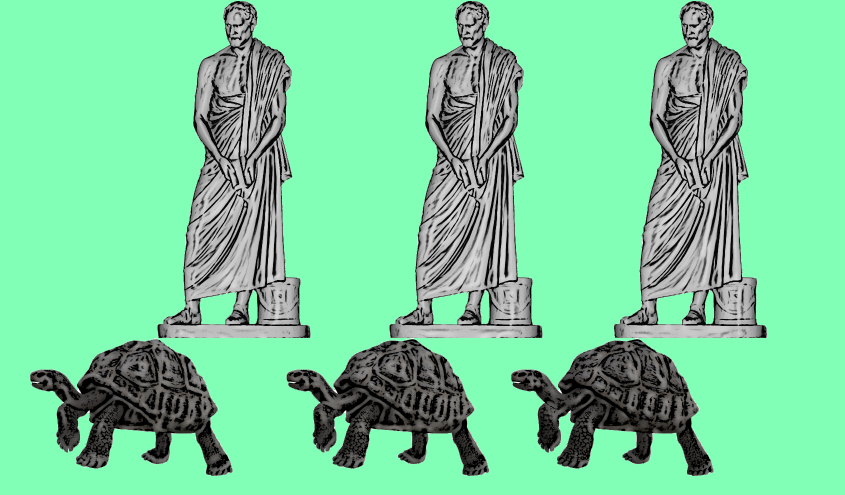Zeno's Paradoxes are a set of philosophical problems attributed to the ancient Greek philosopher Zeno of Elea. They are meant to challenge our understanding of motion, space, and time. Though these seem confusing let us see a story based on each to deduce something that will be useful to apply in our life.
1. Dichotomy Paradox:
Imagine you are walking to a destination. Before you can reach it, you must first travel half the distance. Before you can reach the halfway point, you must travel half of that distance, and so on, infinitely. Therefore, according to this paradox, motion is impossible because you would have to complete an infinite number of tasks (reaching each halfway point) to reach your destination.
Title: The Infinite Quest
In a land where time seemed to stand still, there was a kingdom ruled by a wise and just king. King Aric was beloved by his people for his fairness and wisdom, but he was troubled by a question that had haunted him for years: could one ever truly reach their destination if they had to first cover half the distance, then half the remaining distance, and so on, infinitely?
One day, King Aric summoned his most trusted advisor, a scholar named Eamon, to discuss this paradox. Eamon, a man of great learning and intellect, pondered the question deeply. He suggested that the paradox might hold the key to understanding the nature of the universe itself.
Determined to find an answer, King Aric embarked on a quest unlike any other. He set out with a small band of loyal knights, traveling across vast deserts, treacherous mountains, and dense forests in search of the truth.
As they journeyed, King Aric and his companions encountered many challenges. They faced fierce storms, hostile creatures, and daunting obstacles. Yet, with each step they took, the distance to their destination seemed to shrink, but never quite disappear.
Despite their efforts, the kingdom they sought always remained just out of reach. King Aric and his knights grew weary, their spirits tested by the seemingly endless quest. But still, they pressed on, driven by a determination to unravel the mystery of the paradox.
Finally, after many long years of travel, King Aric and his companions arrived at a great temple high in the mountains. There, they met a group of wise sages who had devoted their lives to studying the nature of existence.
The sages listened carefully as King Aric recounted his quest and his struggle to understand the paradox. After much deliberation, the sages spoke, their voices echoing through the temple halls.
"The Dichotomy Paradox is not a barrier to reaching your destination," they said. "Rather, it is a reminder that the journey itself is the destination. Life is a series of steps, each one bringing you closer to your goals, but never truly reaching an end."
With this revelation, King Aric and his companions understood. The journey they had undertaken had not been in vain. It had taught them valuable lessons about perseverance, determination, and the true nature of time and space.
And so, King Aric returned to his kingdom, his heart at peace. He had not found a definitive answer to the paradox, but he had discovered something far more profound: the joy of the journey itself.
2. Arrow Paradox:
This paradox deals with the concept of time and motion. Zeno argued that at any single instant, an arrow in flight is motionless. Therefore, motion is an illusion.
In the kingdom of Lysandria, there was a renowned archer named Lysara whose skill with a bow was unmatched. She could hit a target from a hundred paces with unerring accuracy, her arrows flying true and fast.
One day, as Lysara was practicing in the royal courtyard, a stranger approached her. He was a traveler from a distant land, and he bore a peculiar contraption in his hands—a device that could freeze time for a single moment.
Intrigued, Lysara agreed to a demonstration. The traveler activated the device, and time seemed to stand still. Lysara drew her bow and fired an arrow at a distant target. The arrow flew through the air, but then, to her amazement, it stopped in mid-flight, frozen in time.
The traveler explained that, according to a paradox he had heard of, at any single instant, an arrow in flight is motionless. Therefore, he claimed, motion is an illusion.
Fascinated by this concept, Lysara invited the traveler to stay in the kingdom and study with the royal scholars. Together, they delved into the mysteries of the arrow paradox, exploring its implications for the nature of time, space, and reality.
As they studied, Lysara began to notice strange things happening around her. Time seemed to behave erratically, with moments stretching into eternity and then collapsing in an instant. She saw shadows that moved on their own and heard whispers carried on the wind.
Determined to understand these phenomena, Lysara embarked on a quest to find the source of the paradox. She traveled to the edge of the kingdom, where the fabric of reality seemed to fray and unravel.
There, she discovered a hidden temple, ancient and overgrown with vines. Inside, she found a chamber filled with strange devices and arcane symbols. At the center of the chamber was a pedestal, upon which sat a glowing orb.
As Lysara approached the orb, she felt a surge of power unlike anything she had ever experienced. She realized that the orb was the source of the paradox, a relic from a time long forgotten that had the ability to freeze time itself.
With great effort, Lysara managed to deactivate the orb, releasing the kingdom from its grip. Time resumed its normal flow, and the strange phenomena ceased.
Returned to her normal life, Lysara reflected on the paradox and its implications. She realized that while the arrow may appear to be motionless at any single instant, it is the sum of all those instants that gives it its true power and beauty.
And so, Lysara continued to practice her archery, knowing that each arrow she fired was a testament to the infinite nature of time and the limitless possibilities it held.
3. Achilles and the Tortoise Paradox:
In this paradox, Achilles races a tortoise. Since the tortoise has a head start, Achilles can never catch up to it, according to Zeno, because Achilles must first reach the point where the tortoise started, but by then, the tortoise has moved a bit further, and so on, ad infinitum.
In the bustling city of Athens, there was a renowned philosopher named Achilles. Known for his sharp mind and love for intellectual challenges, Achilles was always seeking to expand his understanding of the world.
One day, while strolling through the city's agora, Achilles overheard a group of scholars debating the nature of motion. Intrigued, Achilles joined the discussion, and soon the conversation turned to Zeno's famous paradox involving Achilles and the tortoise.
As the scholars debated, Achilles listened intently, his curiosity piqued. According to the paradox, if Achilles gives the tortoise a head start in a race, he can never overtake it. This is because, by the time Achilles reaches the point where the tortoise started, the tortoise will have moved a little further ahead. And when Achilles reaches that new point, the tortoise will have moved again, and so on, ad infinitum.
Inspired by the paradox, Achilles decided to conduct an experiment of his own. He enlisted the help of a friend, a talented sculptor named Pythia, and together they constructed a series of statues representing Achilles and the tortoise at different points along the race course.
Using these statues as markers, Achilles set out to run the race, determined to prove or disprove the paradox once and for all. As he ran, Achilles passed each statue in turn, marking his progress and calculating the distance between himself and the tortoise.
To his surprise, Achilles found that as he passed each statue, he was able to overtake the tortoise with ease. By breaking the race down into smaller and smaller segments, Achilles was able to reach the finish line in a finite amount of time, despite the paradox.
Excited by his discovery, Achilles returned to the scholars and shared his findings. They were amazed by his ingenuity and praised him for his insight. Achilles had not only solved the paradox but had also deepened his understanding of motion and space.
From that day on, Achilles was known not only as a great philosopher but also as a brilliant thinker who had overcome one of the greatest paradoxes of all time. His story became legend, inspiring others to think creatively and boldly in the face of seemingly insurmountable challenges.



Comments
Post a Comment